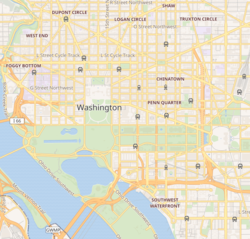National Law Enforcement Museum
Location within Washington, D.C. | |
| Established | October 13, 2018 |
|---|---|
| Location | 444 E St NW, Washington, D.C. |
| Coordinates | 38°53′48″N 77°01′03″W / 38.8967°N 77.0176°W |
| Type | History museum |
| Executive director | Thomas Canavan |
| Curator | Scott Habes |
| Public transit access | |
| Website | lawenforcementmuseum |
The National Law Enforcement Museum is a mostly-underground facility located adjacent to the National Law Enforcement Officers Memorial in Washington, DC's Judiciary Square (400 block of E Street, NW). The museum covers American law enforcement through interactive exhibits, historical and contemporary artifact collections, with a dedicated space for research and educational programming.
The museum officially opened on October 13, 2018. It was criticized by reviewers for espousing copaganda.[1] In 2019, the museum was reported to be unpopular with the public and expected to default on its loans.[2]
History
In 2000, the United States Congress authorized the establishment of the National Law Enforcement Museum, to tell the story of law enforcement in the United States. Stories of the fallen will be featured in the Museum's "Hall of Remembrance." The bill, signed into law by President Bill Clinton on November 9, 2000, authorized the planning for the museum. The public review process to authorize construction at the site took five years.[3]
On October 14, 2010, Attorney General Eric Holder, Homeland Security Secretary Janet Napolitano and others broke ground on the construction of the museum.[3] As of October 2012, over $58 million in private donations have been raised.[3]
On February 28, 2014, Rep. Steny Hoyer introduced the bill To amend the National Law Enforcement Museum Act to extend the termination date (H.R. 4120; 113th Congress) into the United States House of Representatives.[4] The bill was signed on May 16, 2014, and extended until November 9, 2016, the authority of the National Law Enforcement Officers Memorial Fund, a nonprofit organization, to construct a museum on federal lands within the District of Columbia honoring law enforcement officers.[5]
Purpose
The Memorial and Museum are both projects of the National Law Enforcement Officers Memorial Fund (NLEOMF), a non-profit, 501(c)(3) organization based in Washington, D.C. The Memorial Fund maintains the Memorial, collects and analyzes information about officer fatalities and publishes research bulletins on fatality trends. As officer fatalities on roadways have increased in recent years, the NLEOMF launched the Drive Safely[6] campaign to decrease law enforcement fatalities on the road.
Design
The architect for the museum is Davis Buckley Architects and Planners, the firm that also designed the Memorial. Plans for the museum's exhibitions include permanent galleries and one changing exhibitions gallery. The design of the permanent galleries was first undertaken by Christopher Chadbourne & Associates of Boston. When that firm closed, the design effort was completed by Studio 647 of Washington D.C. (exhibition design) and One By Design of Gloucester, MA (graphic design). Media elements were produced by Richard Lewis Media Group and Donna Lawrence Productions. The exhibits were built and installed by Design and Production Incorporated of Lorton, VA.
The building is located below ground with two entrance pavilions with 55,000 square feet (5,100 m2) of interior space. The excavation for the building is 60 feet (18 m) below the surface. Exhibits and highlights include:
- The U.S. Park Police helicopter that responded to the Air Florida Flight 90 crash into the Potomac River
- A costume from the 1987 film RoboCop
- A sweat shirt worn by character Jack Bauer in the TV series 24
- Artifacts of FBI Director J. Edgar Hoover[3]
- DC Sniper Task Force evidence related to the investigation and trial of the Beltway sniper attacks of October 2002
- Memorabilia related to the prohibition-era federal agent Eliot Ness and his team of "Untouchables"
- Handcuffs used by the police to arrest Sirhan Sirhan, after the latter fatally shot US Senator and presidential candidate Robert F. Kennedy in June 1968 at the Ambassador Hotel in Los Angeles
- Badge, gun and a coin purse belonging to American Old West lawman Pat Garrett who became famous for killing frontier outlaw Billie the Kid in 1881
- Badge and Deputy US Marshal commission that belonged to Ted Hinton-the youngest of the posse that ambushed and killed fugitive couple Bonnie and Clyde near Gibsland, Louisiana, on May 23, 1934
- Bulletproof vest from c.1930 that was used by gangster Al Capone
- An Indiana State Police car
Reception
In a review of the institution for The Washington Post, article acknowledged the importance of a Law Enforcement Museum but criticized the institution for "missed opportunities" and stated, "I know I have a newfound appreciation for their difficult jobs. But until it starts offering the larger context, the National Law Enforcement Museum leans more toward propaganda than education."[1] Bloomberg Businessweek reported that the museum was unpopular among the public and was projected to "default on some of the $103 million it borrowed in 2016."[2]
References
- ^ a b Dingfelder, Sadie (7 February 2019). "The new National Law Enforcement Museum is straight-up copaganda". The Washington Post.
{{cite web}}: CS1 maint: url-status (link) - ^ a b Albright, Amanda (18 March 2019). "Richard Belzer and Clint Eastwood Can't Save the Failing National Law Enforcement Museum". Bloomberg Businessweek.
{{cite web}}: CS1 maint: url-status (link) - ^ a b c d Trescott, Jaqueline (October 15, 2010). "Law enforcement museum is on track". Washington Post. p. C5.
- ^ "H.R. 4120 - All Actions". United States Congress. Retrieved 30 April 2014.
- ^ "CBO - H.R. 4120". Congressional Budget Office. Retrieved 28 April 2014.
- ^ Drive Safely Website
External links
- National Law Enforcement Museum official website
- National Law Enforcement Officers Memorial Fund official website
- Davis Buckley Architects and Planners official website

